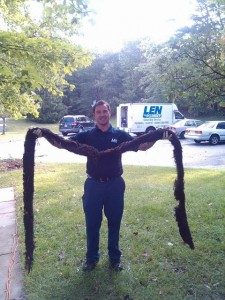What Happens When Your Sewer Backs Up?
 Backups are a distinct and messy sign that something’s not right with your sewer line or plumbing system. Basically, sewer line backups occur when some type of blockage is preventing wastewater from properly flowing away from your home toward the municipal sewer system.
Backups are a distinct and messy sign that something’s not right with your sewer line or plumbing system. Basically, sewer line backups occur when some type of blockage is preventing wastewater from properly flowing away from your home toward the municipal sewer system.
Figuring out precisely what’s stopping the wastewater flow in your system is the key to fixing the problem and preventing future backups.
Sewer Line Backups: How They End Up in Your Home
Here’s an overview of how sewer line backups can start, progress, and wind up spilling over into your home.
- A blockage halts the flow of wastewater: The blockage can arise from various things, like sewer line clogs or tree root infiltration into your sewer line. It may also be caused by sewer line damage, like cracks or holes in the line, a sagging or collapsed sewer line, or a complete break in the sewer line itself.
- Wastewater builds up in the sewer line: With nowhere to go, wastewater will accumulate in the portion of the line that’s connected to a home. As plumbing fixtures in that home are used, more and more wastewater will build up in the line.
- Wastewater will find the nearest release point: Eventually, the line will be filled with wastewater, unable to hold any more. When that happens, wastewater will find the closest discharge point. This will be the lowest drain in a home, which is typically a basement floor drain or a drain on the lowest level of a home.
- The backup will continue to build and cause problems with a home’s plumbing fixtures: As wastewater keeps building up in the sewer line, it can start to enter the drain lines that connect to a home’s plumbing fixtures. This will trigger problems with these fixtures, like multiple drain clogs at one time and gurgling toilets and drains. These problems can also include persistent foul odors coming from drains and backups in tubs or sinks when toilets are flushed.
At this point, it’s usually quite apparent that something’s not right with the plumbing, and it’s time to call a professional plumber for help.
How a Plumber Diagnoses & Fixes Sewer Line Backups
Professional plumbers, like the experts at Len The Plumber, will do several things to identify what’s causing the backup and the best way to fix it. This includes:
- Asking questions about how long the problem has been happening, whether it’s happened before, and exactly what you’re experiencing
- Testing the plumbing fixtures to see how they’re behaving and get a better idea of what the problem likely is
- Performing a pipe and sewer line camera inspection to see what’s happening inside of your lines, what the problem is, and where it lies
At this point, the plumber can determine what’s causing the problem and the best-fit solution for fixing it.
When Your Sewer Backs Up, Call Len The Plumber for Help
Len The Plumber is the team you can trust whenever you’re dealing with sewer line backups or emergencies. When it comes to drains and sewers, we’ve seen and fixed it all! Because we know how critical these problems can be, we proudly offer 24-hour emergency service at no extra cost!
Call Len The Plumber at 800-950-4619 for emergency sewer service now! We’ll be there within 2 hours, and we’ll give you a FREE, written estimate upfront.
For non-emergency sewer or plumbing service, you can also contact us online.
For more than 20 years, Len The Plumber has been dedicated to providing first-class plumbing service and solutions throughout Maryland, Northern Virginia, Pennsylvania, Delaware, and Washington, D.C.
We invite you to check out our glowing reviews to see why we’re a leading plumbing company, and we encourage you to contact us whenever you need plumbing service so that you can experience our excellence for yourself!
This post first appeared on https://lentheplumber.com